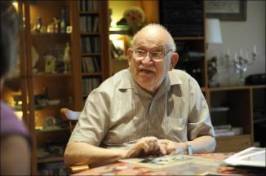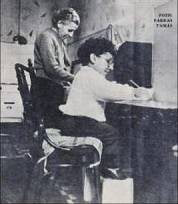BUDAPEST, late in 1944, a Jewish teenager and his mother desperately search the war-torn city for shelter from the Nazis.
They come to the home of a cleaning lady and her disabled daughter who, despite the grave risk to their own lives, take them in at once.
This week, the teenager – North Shore resident Stephen Colman, 82 – is back in Hungary.
He is presenting the daughter, Karolina Reszeli, with the Esfira Maiman Women Rescuers Medal and the Raoul Wallenberg Medal for ”humanitarian spirit, personal courage and non-violent action in the face of enormous odds”.
Her mother Zsuzsanna will be awarded the medals posthumously.
Mr Colman says it is a small reward for an act of heroism that almost certainly saved the lives of him and his mother.
”It was at the height of the Arrow Cross’ Nazi terror,” Mr Colman said. ”I don’t remember how I found the Reszelis but, when I met them, they both must have known, without me asking, that my mother was being persecuted.
”There was nothing said about money or any reward, they simply regarded it as natural to help.”
Mr Colman said Zsuzsanna Reszelis was ”just an ordinary cleaning lady” and her daughter, whom everyone called Csopi (”Tiny”), was a dwarf.
”Their flat was a very poor little flat – they rented it, of course – and they were hiding two people already, although they must have known they were risking their own lives by taking in Jews.
”It was a tremendously brave thing to do. Their help was extraordinary.”
Mr Colman’s mother, and his father, who was sheltered by a Budapest brothel owner, both survived World War II and the family moved to England before ending up in Australia.
He said his mother stayed in touch with the Reszeli women and sent clothes, especially children’s clothes for Csopi, and small amounts of cash.
When Mrs Reszeli died, his mother mourned the loss of a dear and valued friend.
And after Mr Colman’s mother died in 1990, he took on the task of supporting the Budapest branch of his family.
He also visited his home town several times so Csopi could meet his brother, wife, daughter and grandchildren.
On his last visit, he found Csopi in hospital, after a stroke which left her unable to walk or use her right arm.
”She was in a big crowded hospital ward, right up in the corner, but her face just lit up when we came in,” he said.
Mr Colman said Csopi was still laughing and happy, despite being unlikely to ever return home or even leave the hospital ward.
”Csopi was a girl of 17 when she took my mother in,” he said.
”She has a twisted spine, she survived breast cancer and now she has had a stroke and can’t use her right arm or leg. So you see good people are not always given anything, except a medal – and they have to wait 64 years for that.” Near the door of Mr Colman’s Chatswood apartment is a family photograph. It shows him, his late wife, two children and seven grandchildren.
”That’s 10 people who wouldn’t have existed if it hadn’t been for Csopi and people like her. They are the consequences of her actions.”


